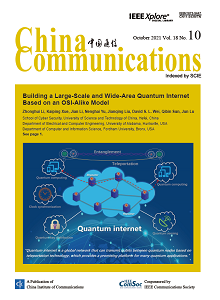An efficient modelling of oversampling with optimal deep learning enabled anomaly detection in streaming data
IF 3.1
3区 计算机科学
Q2 TELECOMMUNICATIONS
引用次数: 0
Abstract
Recently, anomaly detection (AD) in streaming data gained significant attention among research communities due to its applicability in finance, business, healthcare, education, etc. The recent developments of deep learning (DL) models find helpful in the detection and classification of anomalies. This article designs an oversampling with an optimal deep learning-based streaming data classification (OS-ODLSDC) model. The aim of the OS-ODLSDC model is to recognize and classify the presence of anomalies in the streaming data. The proposed OS-ODLSDC model initially undergoes preprocessing step. Since streaming data is unbalanced, support vector machine (SVM)-Synthetic Minority Over-sampling Technique (SVM-SMOTE) is applied for oversampling process. Besides, the OS-ODLSDC model employs bidirectional long short-term memory (BiLSTM) for AD and classification. Finally, the root means square propagation (RMSProp) optimizer is applied for optimal hyperparameter tuning of the BiL-STM model. For ensuring the promising performance of the OS-ODLSDC model, a wide-ranging experimental analysis is performed using three benchmark datasets such as CICIDS 2018, KDD-Cup 1999, and NSL-KDD datasets.通过优化深度学习实现流数据异常检测的超采样高效模型
最近,流数据中的异常检测(AD)因其在金融、商业、医疗保健、教育等领域的适用性而备受研究界关注。深度学习(DL)模型的最新发展有助于异常数据的检测和分类。本文设计了一种基于深度学习的流数据分类(OS-ODLSDC)模型。OS-ODLSDC 模型的目的是识别流数据中存在的异常并进行分类。拟议的 OS-ODLSDC 模型首先要经过预处理步骤。由于流数据是不平衡的,因此要应用支持向量机(SVM)--合成少数群体过度采样技术(SVM-SMOTE)进行过度采样处理。此外,OS-ODLSDC 模型还采用了双向长短时记忆(BiLSTM)进行 AD 和分类。最后,采用均方根传播(RMSProp)优化器对 BiL-STM 模型进行优化超参数调整。为确保 OS-ODLSDC 模型的良好性能,我们使用三个基准数据集(如 CICIDS 2018、KDD-Cup 1999 和 NSL-KDD 数据集)进行了广泛的实验分析。
本文章由计算机程序翻译,如有差异,请以英文原文为准。
求助全文
约1分钟内获得全文
求助全文
来源期刊

China Communications
工程技术-电信学
CiteScore
8.00
自引率
12.20%
发文量
2868
审稿时长
8.6 months
期刊介绍:
China Communications (ISSN 1673-5447) is an English-language monthly journal cosponsored by the China Institute of Communications (CIC) and IEEE Communications Society (IEEE ComSoc). It is aimed at readers in industry, universities, research and development organizations, and government agencies in the field of Information and Communications Technologies (ICTs) worldwide.
The journal's main objective is to promote academic exchange in the ICTs sector and publish high-quality papers to contribute to the global ICTs industry. It provides instant access to the latest articles and papers, presenting leading-edge research achievements, tutorial overviews, and descriptions of significant practical applications of technology.
China Communications has been indexed in SCIE (Science Citation Index-Expanded) since January 2007. Additionally, all articles have been available in the IEEE Xplore digital library since January 2013.
 求助内容:
求助内容: 应助结果提醒方式:
应助结果提醒方式:


